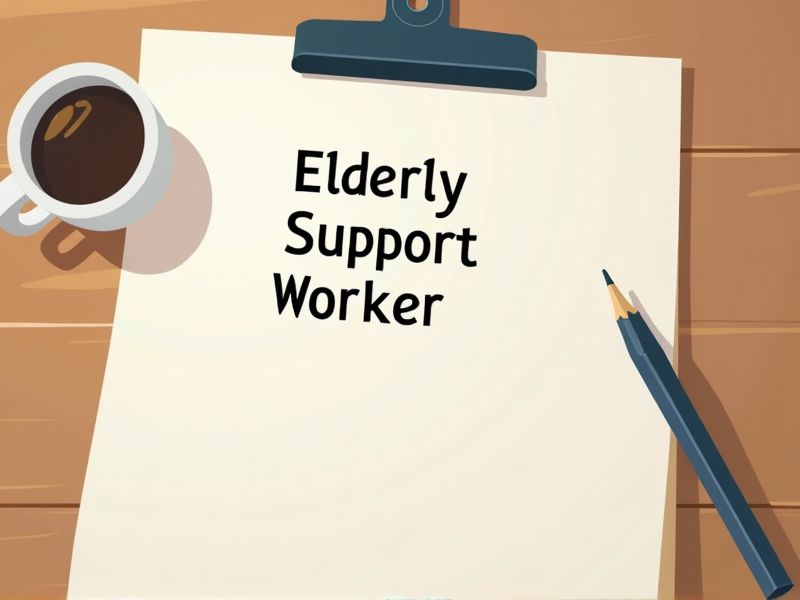
Elderly support workers play a crucial role in ensuring the well-being and quality of life for older adults, which necessitates a comprehensive skill set and understanding of age-related issues. Certifications provide the necessary knowledge and validate the competencies required to manage the complex physical and cognitive needs of the elderly. Proper certification ensures adherence to safety and health protocols, fostering trust between the support worker, their clients, and their families. Here are some vital certifications you may need as an Elderly Support Worker.
Certified Nursing Assistant (CNA)
Certified Nursing Assistants (CNAs) provide essential medical and daily care, fulfilling the physical health needs of elderly individuals. CNAs offer critical support in administering medication and monitoring vital signs, ensuring timely healthcare intervention. Their presence aids in alleviating the emotional and mental stress of both the elderly and their families through compassionate companionship. By supporting activities of daily living, CNAs enhance the overall quality of life and extend the independence of elderly individuals.
Personal Care Assistant Certification
Personal Care Assistant Certification establishes a standardized level of competency, ensuring that elderly support workers possess the necessary skills to provide high-quality care. It provides assurance to families and care facilities that the worker is knowledgeable about elderly needs, including mobility support and personal hygiene. Regulatory requirements and liability concerns necessitate that certified individuals are employed, reducing the risk of accidents or neglect. Certified workers are also better equipped to handle medical emergencies, improving overall health outcomes for the elderly population.
CPR and First Aid Certification
CPR and First Aid Certification equips elderly support workers with essential skills to respond effectively during a cardiac arrest or medical emergency. The elderly population often faces higher health risks, demanding prompt and competent emergency care. Certification enhances the confidence and preparedness of workers in life-threatening situations. Employers value these certifications, often making them a prerequisite for caregiving roles, thereby increasing job opportunities and professional credibility.
Medication Administration Certification
Medication Administration Certification is required for elderly support workers to ensure they can accurately and safely administer medications, reducing the risk of medication errors. When support workers are certified, they gain essential knowledge about drug interactions and potential side effects, improving patient care quality. Certification equips workers with the skills to properly document and monitor medication effects, enhancing accountability and communication with other healthcare professionals. Proficiency in medication administration builds trust with patients and families, fostering a reliable caregiving environment.
Dementia Care Certification
Dementia care certification equips elderly support workers with specialized skills to better understand and manage the complexities of dementia-related behaviors. When workers receive targeted training, they are more adept at ensuring the safety and well-being of individuals with dementia. Certification often leads to improved communication techniques tailored for those experiencing cognitive decline, enhancing patient interaction. By having a certified workforce, care facilities can ensure a higher standard of care, which can contribute to better overall quality of life for their residents.
Mandated Reporter Training Certification
Mandated Reporter Training Certification is crucial for elderly support workers to ensure they recognize and respond to elder abuse and neglect appropriately. Certification provides these workers with the necessary skills to identify signs of mistreatment, leading to improved protection of vulnerable seniors. Training fosters a legally sound approach, ensuring compliance with state and federal reporting laws. This certification instills confidence in relatives and guardians, knowing caregivers are qualified to safeguard their loved ones.
Palliative Care Certification
Palliative Care Certification equips elderly support workers with specialized knowledge to manage the complex needs of terminally ill patients. Enhanced skills in pain management and emotional support result directly from this certification, improving patient comfort. Certification indicates a recognized standard of competence, leading to increased trust between workers and families. As the elderly population grows, the demand for trained palliative care professionals rises, necessitating certification for effective healthcare delivery.
Mental Health First Aid Certification
Elderly support workers often encounter seniors who face mental health challenges, such as depression or anxiety, partly due to age-related changes or isolation. By obtaining Mental Health First Aid Certification, these workers can recognize early signs of mental health issues, enabling prompt intervention and support. Training provides tools to effectively communicate and de-escalate situations, fostering a safer and more supportive environment for seniors. Certified workers can better navigate the complexities of elder care, ensuring comprehensive well-being beyond physical health.
Aged Care Management Certification
The aged care management certification equips elderly support workers with specialized knowledge to address the complex health challenges that come with aging. This certification ensures that workers are trained in best practices for ethical and compassionate care, enhancing the quality of life for seniors. It aids in compliance with regulatory standards, which are crucial to maintaining safety and legal responsibility in aged care settings. Implementing certified strategies improves communication skills, enabling workers to effectively engage with elderly individuals and their families.
Nutrition and Food Safety Certification
Nutrition and Food Safety Certification ensures elderly support workers understand dietary needs specific to aging, reducing risks of malnutrition. Certification equips them with knowledge to prevent foodborne illnesses, which older adults are more susceptible to due to weakened immune systems. Proper certification provides skills to prepare and store food safely, enhancing the overall well-being of elderly clients. These credentials increase trust between caregivers and families, assuring that nutritional care standards are met.
Summary
When you gain certifications as an Elderly Support Worker, your competence in providing specialized care increases, boosting both confidence and quality of service. Certification often leads to better job opportunities and higher salaries, as employers recognize and reward your enhanced skills and qualifications. You build trust with families and clients, knowing you are well-equipped to meet the complex needs of the elderly. The certification process can foster personal growth by keeping you informed about the latest practices and policies in elderly care.
